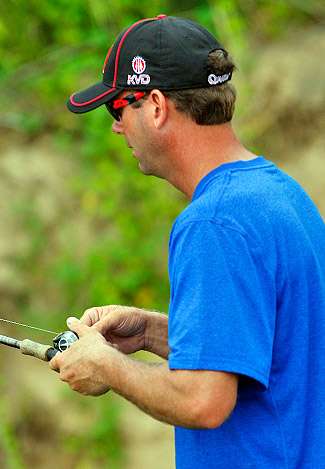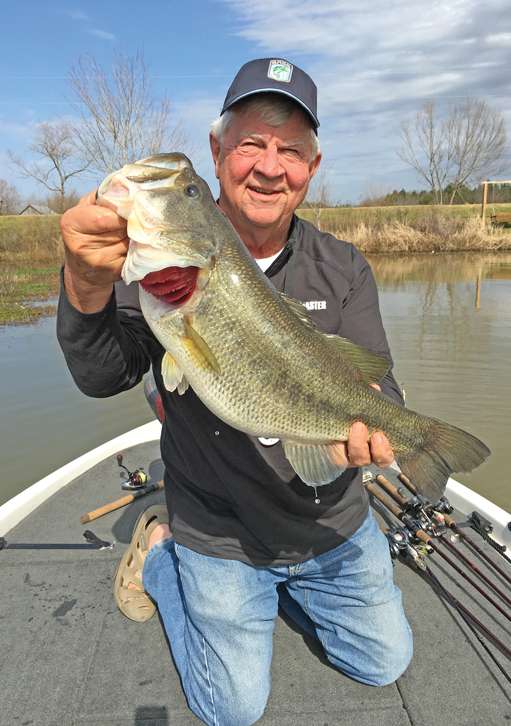
MONTGOMERY, Ala. — Riding along the Alabama River Friday, chasing competitors in the Toyota Trucks Championship Week and filing reports on the practice fishing for www.bassmaster.com, I was overwhelmed with memories of past days and events on this river. They are pleasant memories, all of them.
Everywhere I looked along the waterway reminded me of fish caught there by me, or my friends, or by professional anglers from long ago. It was on this river that I learned much of whatever I know about bass fishing, where I tried to put into practice what I read in the articles I edited for Bassmaster Magazine.
It's where I taught my children to fish, and where I spent many relaxing hours during my more than a quarter century in Montgomery. I miss this place.
More importantly, the river has historical significance in the realm of bass fishing. As you'll recall, the host city this week, Montgomery, Ala., is where Ray Scott founded BASS in 1968. And, building on the success of the Bassmaster Classic, Scott carried out his dream of making the Classic a sports spectacle by conducting the first indoor, drive-through weigh-ins in 1981.
The Alabama River was the fishery for Classic XI, although Scott tried his best to get it renamed "Lake Montgomery." We on the editorial staff and communications department of BASS were directed to use that name, never the official one, in anything we wrote.
Nevertheless, the name didn't stick.
Stanley Mitchell, the boy wonder from Georgia, won the first Alabama River Classic with 35 pounds, 2 ounces. (At 21 years old, he's still the youngest Classic champion ever.) Mitchell won because he stuck a 5-pounder on a crankbait near the end of the last day of competition at the mouth of Swift Creek. Otherwise, Harold Allen, less than a pound down, would have claimed the championship.
The field that year was full of legends: Hank Parker, Roland Martin, Larry Nixon, Ricky Green, Bobby Murray, George Cochran and others who've gone on to TV careers or greener pastures. Also contending was a young gun from California, Gary Klein, who burst on the BASS scene in 1979 as a brash, 21-year-old kid who introduced himself by winning the Arizona Invitational on Lake Powell and almost beating Roland Martin out of Angler of the Year.
Klein is among the 12-angler field in Championship Week, and I bet he's feeling a little nostalgic himself. For the record, Klein was 27th in the '81 Classic. He weighed in 6 pounds, 8 ounces, and Roland Martin is credited with 3 pounds, 15 ounces — paltry for a seven-fish limit and a three day tournament. Those aren't typos. This Classic was held during the time Scott imposed a 14-inch minimum length limit for all BASS tournaments. He did so for conservation reasons, and without thinking about the fact that the Alabama River — sorry Ray, "Lake Montgomery" — isn't blessed with a whole lot of 14 inch bass.
Paul Elias won the 1982 championship with the kneel & reel technique, which he used to drive his crankbaits an extra foot or two deeper and across a deep sandbar loaded with bass. Elias was fishing in the Holy Ground area when he amassed a 10-pound lead over his nearest competitor, Jack Chancellor.
Chancellor of Phenix City, Ala., was using a weird little setup he called the "Do-Nothing Rig." He slipped a 1-ounce sinker onto his line, added a swivel then 2 or 3 feet of leader line. At the end, he tied a 4-inch pre-rigged worm he was manufacturing at the time. The straight, nothing-looking worm had two small, exposed crappie hooks molded in, but boy did it catch river fish. He would prove its worth in 1985 by winning the Classic on the Arkansas River at Pine Bluff with his Do-Nothing Rig.
We know the technique today as Carolina rigging, and it has revolutionized deepwater fishing, especially in rivers.
Now, the Alabama River is home to the second leg of the "Post Season," a novel and exciting event that determines who wears the Toyota Tundra Angler of the Year belt for the next 12 months. It's a playoff system that puts a dozen of the world's best bass anglers through a meat grinder of fishing to determine the best of the best. It's also adding to the history of competitive bass fishing, I believe.
I'm honored to have a front row seat.

